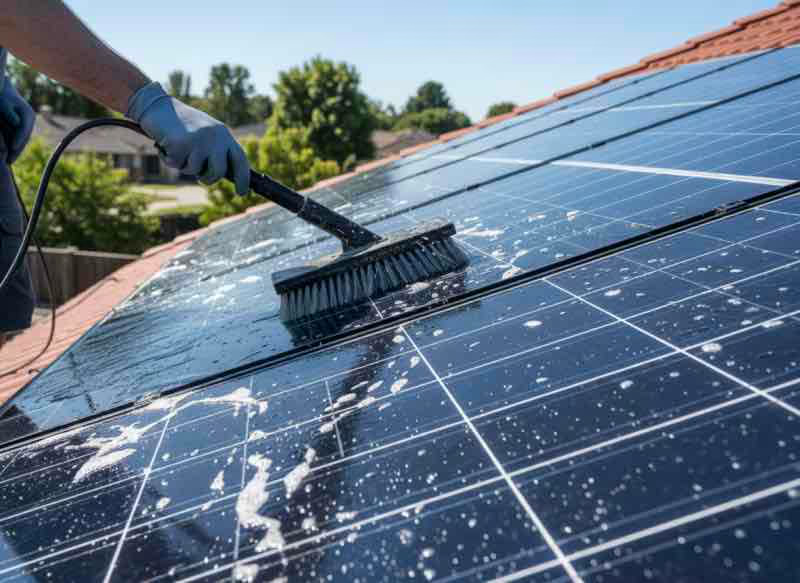
Solar Panel Pressure Washing in Longwood, FL – Restore Peak Output Without Panel Damage
In Longwood, solar panels collect pollen from oak trees, Love Bug residue in May and September, and limestone dust from Central Florida's hard water. We use safe low-pressure cleaning methods that remove efficiency-robbing buildup without voiding manufacturer warranties or cracking tempered glass. Most residential solar arrays in Longwood can be cleaned in 1–2 hours with immediate output improvement visible on your inverter monitor. Our professional pressure washing service protects your solar investment while restoring 15–25% energy production lost to organic film and mineral deposits.
What PSI is Safe for Pressure Washing Solar Panels in Longwood, FL?
Solar panels in Longwood should be cleaned at 500–800 PSI maximum to avoid cracking tempered glass or forcing water under the frame seal. Most professional Longwood solar panel pressure washing services use soft wash systems (under 100 PSI) with deionized water to prevent mineral streaking from Central Florida's limestone aquifer. High-pressure wands (1,500+ PSI) can void manufacturer warranties and cause micro-fractures that reduce output over time.
- Soft wash nozzle (40–100 PSI): Removes pollen, Love Bug residue, algae
- Deionized water rinse: Prevents hard water spots on glass
- No abrasive brushes or soaps: Protects anti-reflective coating
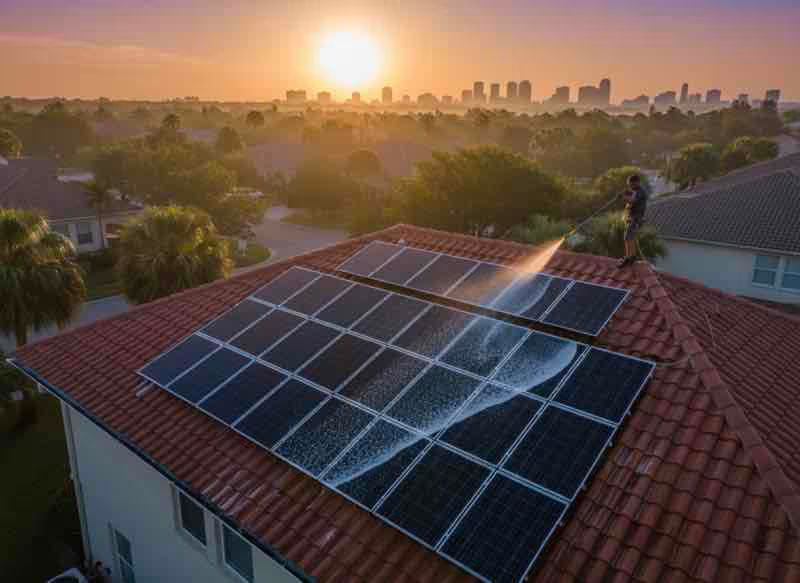
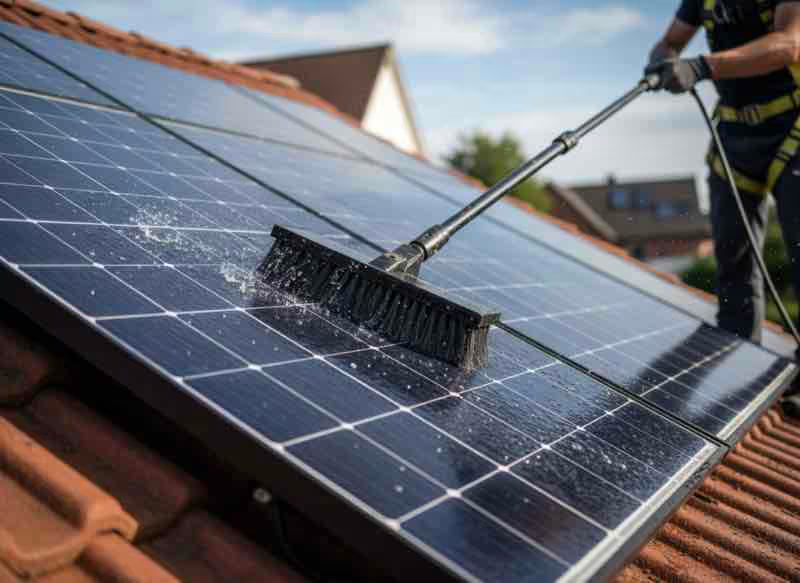
Low-Pressure Soft Wash Protects Solar Panel Surfaces and Warranties
Homeowners with rooftop solar in neighborhoods like Wekiva Springs and Markham Woods often see white film or green algae on panels. We use soft wash methods under 100 PSI to remove organic buildup without forcing water into electrical junctions or cracking tempered glass. Longwood's humid subtropical climate accelerates algae growth on north-facing panels that receive morning dew but limited direct sun until afternoon. Our low-pressure approach cleans thoroughly while keeping your warranty intact and your panels safe from damage.
Pollen, Love Bug Splatter, and Hard Water Stains Reduce Solar Output in Longwood
Homeowners often notice inverter production drops 15–25% during oak pollen season (March–April) or after Love Bug migrations coat panels in acidic residue. Removing opaque film restores photon absorption. Even thin haze blocks enough light to cut daily kWh generation and extend your payback period. Panels in The Springs and near Lake Fairy accumulate more pollen due to dense oak canopy and prevailing easterly winds carrying tree debris. Regular cleaning keeps your system producing at full capacity and maximizes your energy savings.
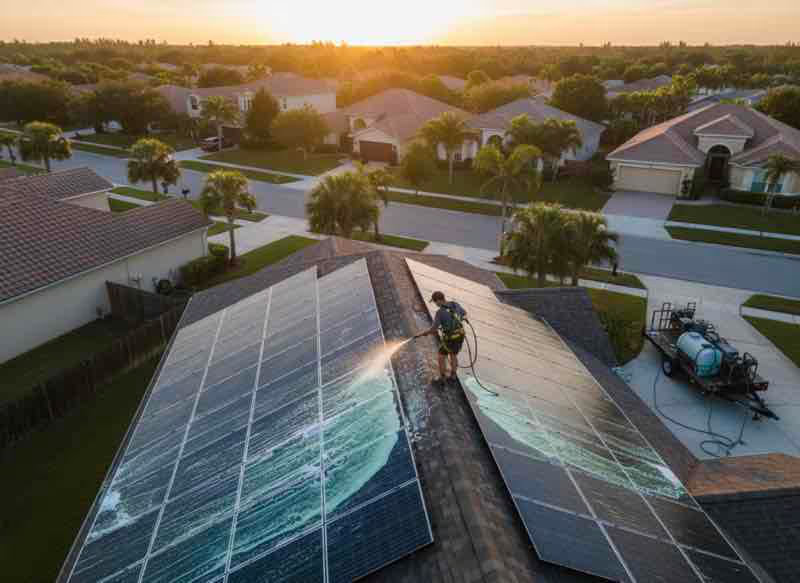
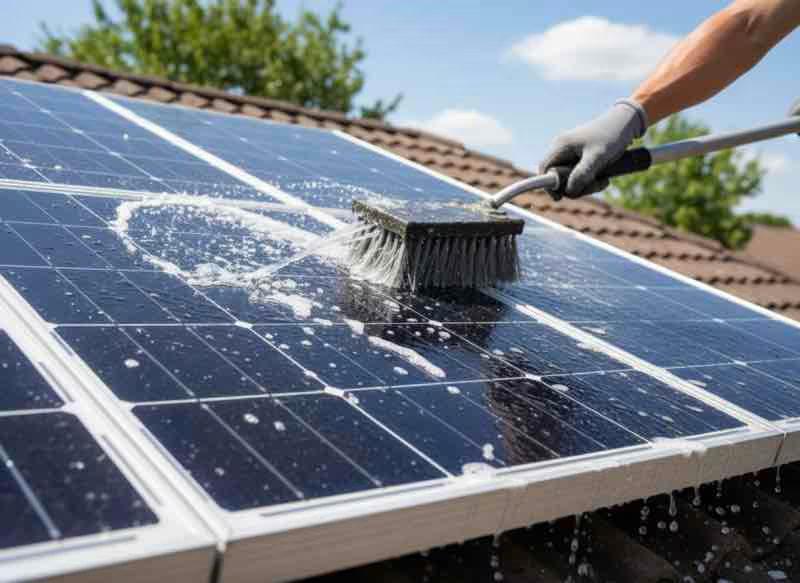
Deionized Water Rinse Prevents Mineral Streaks on Tempered Glass
Solar owners in Longwood get frustrated when white streaks reappear days after rain. Central Florida tap water leaves calcium carbonate deposits on hot glass that attract more dirt. We use deionized water with zero dissolved solids so it evaporates without residue. Your panels dry clear and stay cleaner longer between services. Longwood municipal water averages 180–220 ppm hardness due to the limestone Floridan Aquifer. A standard hose rinse guarantees mineral film will return within one rain cycle, reducing your system's efficiency again.
Spring and Fall Cleaning Matches Longwood's Heaviest Pollen and Bug Seasons
Homeowners schedule preventive service before summer FPL peak-demand months when solar offsets matter most for electric bills. Cleaning in April (post-pollen) and October (post-Love Bug) keeps panels operating at full capacity during high-sun months when production peaks. We provide morning service before 10 AM to prevent thermal shock. Spraying cold water on 150°F panels in midday Longwood heat can stress glass and micro-solder points. Timing your cleaning around seasonal buildup protects your investment and maximizes output when you need it most.
Panel-Safe PSI Ranges Prevent Micro-Cracks and Water Intrusion
Homeowners need proof the service won't void SunPower, Tesla, or Enphase warranties that prohibit high-pressure cleaning. Commercial pressure washing uses fan-tip nozzles at 500–800 PSI max or soft wash pumps under 100 PSI. Both methods remove dirt without exceeding manufacturer force limits. Florida Building Code wind-load ratings mean Longwood panels are secured for 140 mph gusts, but glass surfaces remain vulnerable to point-pressure from zero-degree spray tips. Our technicians follow manufacturer guidelines to protect your warranty and prevent damage that could cost thousands in repairs.
Regular Cleaning Extends Inverter Lifespan and Panel Efficiency
Solar owners protect 25-year panel investments and 10-year inverter warranties by preventing heat buildup caused by dirt-insulated surfaces. Clean panels run 10–15°F cooler in summer. Lower operating temperature reduces inverter strain and slows degradation of silicon cells and solder bonds. According to the <a href="https://www.energy.gov/energysaver/articles/solar-panel-maintenance-what-you-need-know" target="_blank" rel="nofollow">U.S. Department of Energy</a>, regular maintenance helps solar systems maintain peak performance over their lifespan. Twice-yearly cleaning in neighborhoods like Sabal Point and Wayside Woods prevents compounding loss. Dirty panels produce less power, which means longer payback and higher cumulative FPL bills over your system's life. We help you maintain peak performance and protect the return on your solar investment.
Frequently Asked Questions
Should you pressure wash sidewalks in Longwood regularly?
Yes, every 6–12 months to control mold and algae growth from Central Florida humidity. Regular cleaning prevents buildup and keeps walkways safe. Shaded areas may need more frequent service due to moisture retention.
How long does sidewalk pressure washing take in Longwood?
1–3 hours for typical residential walkways including pre-treatment, washing, and final rinse. Longer properties or heavily stained concrete may take additional time. We provide accurate estimates after seeing your specific walkway.
What time of year is best for sidewalk cleaning in Longwood?
October through May offers lower humidity and fewer afternoon storms for optimal drying conditions. We schedule year-round but cooler months provide faster drying. Summer morning appointments work well before daily rain starts.
What PSI is safe for cleaning concrete sidewalks?
2,500–3,500 PSI with a 25-degree or surface cleaner nozzle prevents damage on standard residential concrete. We adjust pressure based on your sidewalk's age and condition. Proper technique matters as much as PSI settings.
Can pressure washing remove rust stains from irrigation water?
Yes, with oxalic acid or rust remover pre-treatment before hot water pressure washing. Iron deposits dissolve and rinse away completely. Multiple treatments may be needed for deep or old rust stains.
Will pressure washing damage my sidewalk or landscaping?
Professional technique with proper PSI and surface cleaners protects concrete. We pre-wet plants and rinse them after cleaning to prevent chemical contact. Your landscaping stays healthy while your sidewalks get clean.
